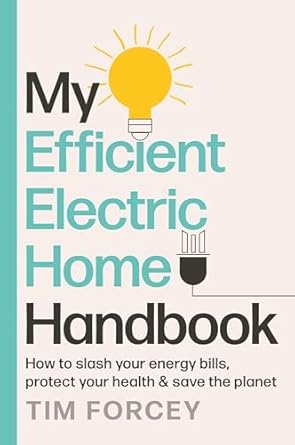Title: My Efficient Electric Home Handbook
Author: Tim Forcey
Publisher: Murdoch Books/Allen & Unwin, 2024; RRP: $29.99
The Author
Tim Forcey is a home comfort and energy adviser, researcher and author. Tim grew up on a dairy farm before pursuing a career as a chemical engineer working around the globe in fossil fuels but left that industry after realising the climate crisis couldn’t wait for him to effect change from within. Following roles with government, the University of Melbourne, and not-for-profit organisations, Tim now thoroughly enjoys helping people make critical changes in their own homes.
The Book
As the front cover boldly states, this is a handbook for making your home energy efficient and electric. Given the rising energy costs, this title has got to be an attention getter. Indeed, for me, this book was an impulse buy. So, was it worth it?
In the introduction Tim outlines why we should aspire to live in an efficient electric home. Or as Tim says: this handbook shows how to stop burning stuff at home, whether that be fossil fuels such as gas or LPG, or even wood. His premise is that electrical options for heating, cooking and cooling are cheaper and more comfortable. Certainly, since I discovered induction cook tops (some time ago), I will never go back to gas for cooking.
Tim claims the key drivers for everything electric are money saved, a more comfortable home that is safer and healthier, and tackling the climate emergency. Even if you don’t agree with the last, the first three should be sufficiently motivating.
Part 1 of the book gives the reader an insight into Tim’s journey from son of a dairy farmer in America, through his employment in the petrochemical industry working for BHP in Melbourne, to an energy evangelist. There is also a summary of the evils of climate change, a little bit about Tim’s role as an energy adviser and some comments about the quality of Australian homes.
Tim spends the rest of the book talking about the opportunities for electrifying your home.
Tim Forcey interviewed for Australia’s Biggest Book Club
@ The Australia Institute
Tim’s writing style is clear, simple and easy to read. Much of it is based on Tim’s experience with his Melbourne residence, giving the book a personal feel. Tim also draws upon research and experience associated with the engineering of domestic energy consumption, and Melbourne University research.
There is a modest but adequate set of endnotes, and a good index is included.
I’m sure there would be other experts in this field who might argue with some of Tim’s opinions. A lot of the advice in this book is, I think, obvious, for example, eliminating draughts. However, I found most of the advice to be practical and achievable for the average household.
This is a great read for anyone setting out to tackle their home energy issues. Even if you are some ways down that path, it is still a good checklist.
This was the first time I saw a convincing statement of the benefits of reverse-cycle heat pump technology over ducted gas for home heating. And considering my recent investment in heat pump technology, it was reassuring to see in My Efficient Electric Home Handbook evidence that my own unscientific observations are correct and therefore made the impulsivity of the book purchase worthwhile.
Reviewed by: Frank Thompson
Ballarat Writers Inc. Book Review Group

Leave a Reply